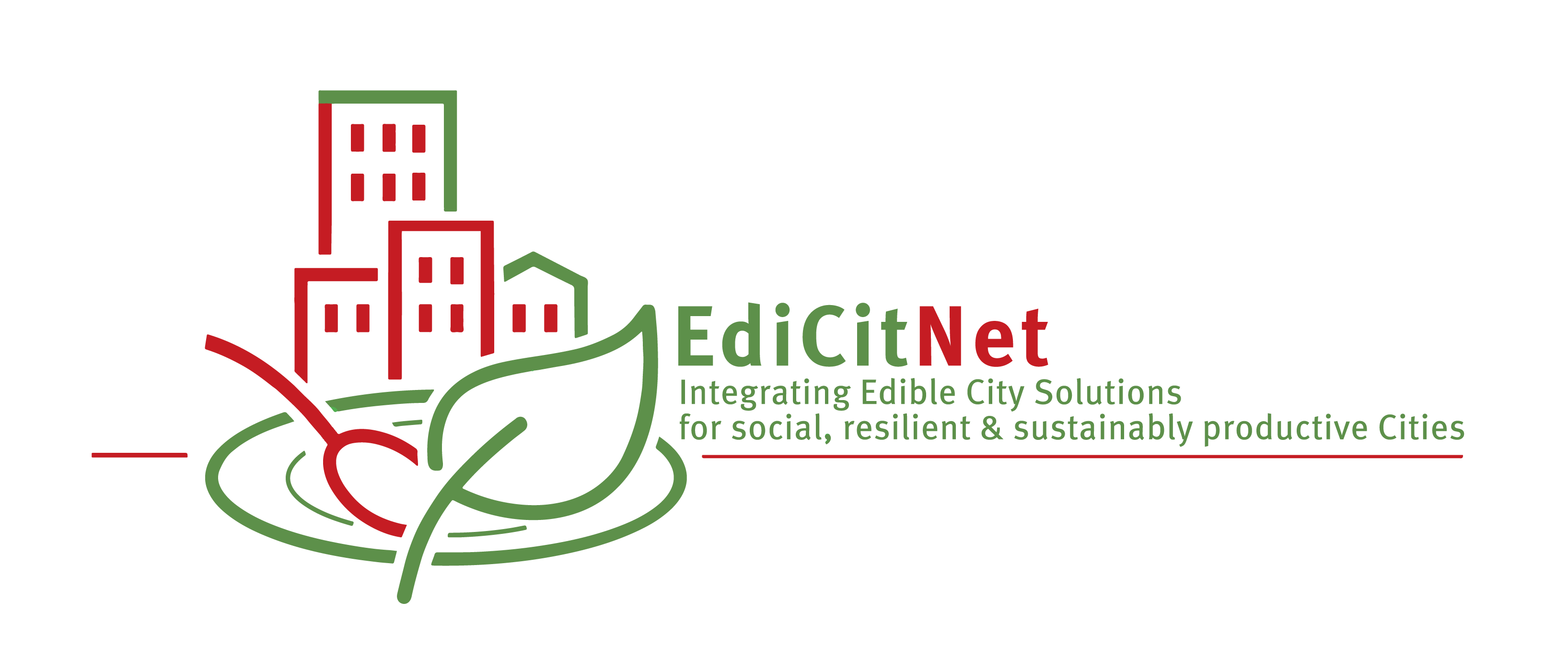
Due to the corona restrictions we here develop a platform for the annual meeting of the H2020 Project EdiCitNet.
The systemic use of urban landscapes for food production is a major step towards more sustainable, liveable and healthier cities. A multitude of initiatives around the World, however fragmented, are prospering, forming a global movement of Edible Cities. Their products, activities and services – the Edible City Solutions (ECS) - empower local communities to overcome social problems by their inclusive and participatory dynamics and to create new green businesses and jobs, and thereby generating local economic growth and fostering social cohesion.
EdiCitNet will leverage the substantial benefits that ECS effect today at local level and catalyse their replication EU- and world-wide by launching a fully open and participatory network of cities, empowering their inhabitants by a common methodology
a) to systematically explore the wealth and diversity of existing Edible City Solutions (ECS),
b) to adapt, plan and implement successfully proven ECS in their specific urban context.
To make this happen, EdiCitNet will close knowledge gaps in the effective implementation of ECS and their transformation into sustainable, innovative business models. This new insight will feed into a openly shared and globally accessible knowledge base and methodology to enable sustainable and evidence-based integration of ECS into the long-term urban planning of cities covering a large spectrum of urban, climatic, social, environmental and cultural contexts. 5 Front Runner Cities (FRC), supported by a highly interdisciplinary consortium of city authorities, SME, NGOs and academia, will demonstrate their unique experience with own Living Labs and transfer their knowledge to 7 dedicated Follower Cities (FC), determined to replicate ECS for the benefit of their inhabitants. The carefully selected group of FRC and FC allows to study and monitor implementation in large variety of environments and also ensures truly global outreach with city partners based in Central America, Africa and East Asia.
- Kursverantwortliche/r: Dr. Ina Saeumel
- Kursverantwortliche/r: Youssef Kashef
- Kursverantwortliche/r: Lisa Velenosi
- Kursverantwortliche/r: Naomi Auer
- Kursverantwortliche/r: Gaspar Cano
- Kursverantwortliche/r: Richard Kempter
- Kursverantwortliche/r: Dr. Paula Kuokkanen
- Kursverantwortliche/r: Prof. Dr. Benjamin Lindner
- Kursverantwortliche/r: Natalie Schieferstein
- Kursverantwortliche/r: Rike-Benjamin Schuppner
- Kursverantwortliche/r: Lisa Velenosi
- Kursverantwortliche/r: Michael Zaks
- Kursverantwortliche/r: Naomi Auer
- Kursverantwortliche/r: Gaspar Cano
- Kursverantwortliche/r: Richard Kempter
- Kursverantwortliche/r: Dr. Paula Kuokkanen
- Kursverantwortliche/r: Prof. Dr. Benjamin Lindner
- Kursverantwortliche/r: Natalie Schieferstein
- Kursverantwortliche/r: Rike-Benjamin Schuppner
- Kursverantwortliche/r: Lisa Velenosi
- Kursverantwortliche/r: Michael Zaks
- Kursverantwortliche/r: Prof. Dr. Michael Brecht
- Kursverantwortliche/r: Andreea Neukirchner
- Kursverantwortliche/r: Lisa Velenosi
- Kursverantwortliche/r: Simon Weber
- Kursverantwortliche/r: Naomi Auer
- Kursverantwortliche/r: Ikhwan Bin Khalid
- Kursverantwortliche/r: Gaspar Cano
- Kursverantwortliche/r: Richard Kempter
- Kursverantwortliche/r: Dr. Paula Kuokkanen
- Kursverantwortliche/r: Prof. Dr. Benjamin Lindner
- Kursverantwortliche/r: Rike-Benjamin Schuppner
- Kursverantwortliche/r: Lisa Velenosi
- Kursverantwortliche/r: Michael Zaks
- Kursverantwortliche/r: Richard Kempter
- Kursverantwortliche/r: Dr. Paula Kuokkanen
- Kursverantwortliche/r: Prof. Dr. Benjamin Lindner
- Kursverantwortliche/r: Natalie Schieferstein
- Kursverantwortliche/r: Rike-Benjamin Schuppner
- Kursverantwortliche/r: Lisa Velenosi
- Kursverantwortliche/r: Michael Zaks
- Kursverantwortliche/r: Lisa Velenosi